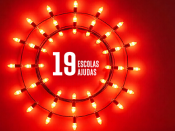Por Sara Fortuna (University of Trieste, Italy).
Abstract: An ideal binder should be capable of capturing with high affinity, sensitivity, and specificity a target molecule. Examples include antibodies and nanobodies optimised in vivo, DNAs and RNAs based aptamers evolved in vitro, and small peptides optimised in silico by exploiting advances in computer power together with the development of new and powerful algorithms for protein folding, docking, and structure prediction. A recent algorithm based on replica exchange Monte Carlo [1] can optimize simultaneously the sequence and conformation of small peptides in order to reach a high binding affinity to a target organic molecule. The algorithm was recently adapted for the generation of peptides for protein recognition. The sequences have been tested by surface plasmon resonance and electrospray ionisation mass spectrometry showing how the computer-generated peptides pinpoints the binding site they have been designed for with high affinity [2]. Further developments allow generating peptides with an even higher affinity towards their targets or even picking a surface exposed non-druggable binding site and design ex novo a binder capable of immobilizing a protein on a surface [3]. This has been shown by nuclear magnetic resonance, and atomic force microscopy. The same algorithm has been further implemented for the design of antibody fragments for biomarker recognition [4].
References:
[1] R. P. Hong Enriquez, S.Pavan, F. Benedetti, A. Tossi, A. Savoini, F. Berti, and A. Laio, J. Chem. Theory Comput. 2012 8 (3), 1121-1128.
[2] A. Russo, P.L. Scognamiglio, R.P. Hong Enriquez, C. Santambrogio, R. Grandori, D. Marasco, A. Giordano, G. Scoles, and S. Fortuna, PLoS ONE, 2015, 10(8): e0133571.
[3] M.A. Soler, A. Rodriguez, A. Russo, A. Feyisara Adedeji, C.J. Dongmo Foumthuim, C. Cantarutti, E. Ambrosetti, L. Casalis, A. Corazza, G. Scoles, D. Marasco, A. Laio, and S. Fortuna, Phys. Chem. Chem. Phys., 2017, 19, 2740-2748.
[4] M.A. Soler,et al, in press.
Short bio: Sara Fortuna graduated in Chemistry in 2007 from the University of Trieste (Italy), has been awarded her PhD in Chemistry from Warwick University (UK) in 2010, and carried out postdoctoral activity in SISSA, Trieste (Italy). In 2013 she started her present activity first at the University of Udine (Italy), then Nova Gorica (Slovenia), and SISSA. Aim of her research is to provide novel theoretical solutions to problems of medical and biological interest through the multiscale modeling of molecular systems. In 2017 she moved to the University of Trieste (Italy) where she now coordinates a joint theoretical-experimental activity based on the computational design of antibody fragments for molecular recognition.













